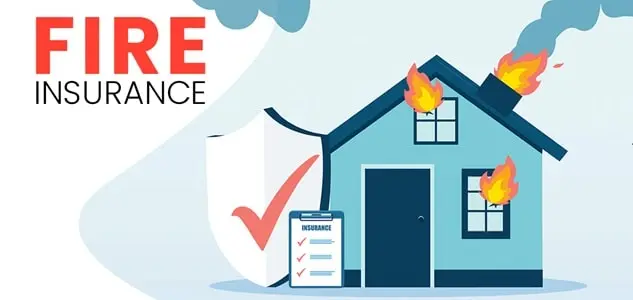It is true that in the evolution of human progress, fire the element that played a very important part. Be it bringing revolution in the living standards or offering the basic requirements to the human along with protection, its benefits are all exceeding. However, along with these benefits, there is certain rate of risks that this element also poses. It is a fact that each and every year, countless homes and properties fall prey to the disasters caused by fire, which results into huge financial losses. The destruction of a complete house needs a spark only, and it can turn all of it into ashes. True that certain fire protection protocols are maintained in the recent days. But the accidents still take place due to unforeseen situations. Having a comprehensive fire insurance polity happens to be a lot helpful in these cases. You might need such policies also, but before that you need to know about the advantages and disadvantages of the policies. So, here we present you the necessary inputs about the same.

Advantages of Fire Insurance
1. Protection Against Physical Property Damages:
Fire insurance fully covers property damage during a fire. In your house or business, electronics, furniture, and products are fire-resistant. Fire insurance covers property damage completely, allowing for quick repairs or replacements to restore normalcy.
2. Safeguard for Your Business:
Organizations with flammable goods or inherent fire dangers need fire insurance to avoid financial responsibility. Fire insurance should cover property, business interruptions, and liabilities. Fire insurance products provide protection by covering medical expenses for fire victims.
3. Peace of Mind:
Fire insurance may provide people and businesses peace of mind by safeguarding their finances against fires. Fire insurance reassures households and companies following major interior design or inventory purchases.
4. Financial Security:
Fire insurance gives financial security by covering fire damages. The insurance firm pays fire victims for property damage, asset losses, and business interruptions. Policyholders may recuperate swiftly and resume normal activities without financial stress due to financial stability.
5. Coverage for Liability Claims:
Liability and property damage are covered by fire insurance. Fires that spread to neighboring buildings are covered by insurance. Liability claim expenses are covered by this comprehensive coverage.
6. Support for Business Continuity:
Company existence depends on fire insurance, which helps recover from fire damage. Companies and stakeholders may lose a lot of money due to fire shutdowns. Insurance helps businesses rebuild, survive fires, and limit economic damage. It accelerates recuperation and maintains organizational continuity throughout difficulty.
7. Temporary Relocation Coverage:
Policyholders may need to relocate during property repairs or reconstruction following a fire. Fire insurance includes interim lodging, food, and transportation. This supports policyholders and their families throughout the stressful move. Fire insurance covers temporary relocation expenses and eases the transition until the property is repaired.
8. Mitigation of Economic Impact:
Fire insurance mitigates the economic impact of fires on individuals and the economy. Fire insurance promptly compensates local communities, suppliers, consumers, and workers for property damage, asset losses, and business interruptions. This financial aid helps enterprises recover swiftly, sustain operations, and retain personnel, improving economic resilience and stability. Fire insurance aids infrastructure and corporate recovery, fostering long-term socioeconomic growth.
Disadvantages of Fire Insurance
1. Different Types of Policies:
A significant downside of fire insurance is the number of coverage options. From Valued insurance to Consequential Loss Policy, insurance kinds might mislead consumers concerning coverage terms and circumstances. Companies must navigate various insurance kinds to provide adequate protection, whereas residential structures just need simple fire policies. Choosing the best insurance type requires effort and research, which may be scary for individuals and businesses.
2. Costly Insurance Premiums:
Policyholders, particularly those with significant property portfolios, may struggle to pay hefty insurance rates. Premiums depend on insurance type, coverage, and risk. Thus, policyholders may pay high premiums that strain their budgets. Companies and individuals must consider fire insurance premiums.
3. Confusing Legal Terms:
Complex legal jargon and criteria make insurance programs hard to grasp. Legal language may confuse insurance coverage and obligations during claims processing, generating conflicts. Small text may confuse insurance policyholders about coverage and restrictions. Fire insurance may struggle to offer timely and suitable financial assistance due to this uncertainty.
4. Risk of Claim Denials:
Denials of claims after a fire might leave policyholders unsupported, creating a huge risk. Insurers refuse claims for failing to follow requirements or disclose critical facts throughout the application procedure. Policyholders may struggle to comprehend and fulfill insurance criteria, leading to claim denials and conflicts. Due to claim approval uncertainty, fire insurance is less trustworthy and beneficial as a financial safety net.
5. Underinsurance and Inflation:
Due to inflation and underinsurance, consumers may undervalue their belongings and pick insufficient fire insurance. Insufficient insurance coverage puts policyholders at risk since fire benefits may not cover all expenses. However, inflation may lower fixed insurance payments’ purchasing power. To prevent underinsurance and inflation, policyholders must regularly review and adjust their insurance arrangements.
Conclusion
It is true that the fire insurance policies are essential when it comes to the financial protections in case of severe fire related accidents; one needs to consider the disadvantages as well before carefully choosing the right policy. At present the policy options are many. Therefore, hopefully you will find the right kind of policy that will serve your purpose in case of an accident. Remember that a proper decision can make you well protected against fire issues. Do review the coverage and the rules of the policy in regular intervals and stay well protected.
For any insurance advice contact us today.

